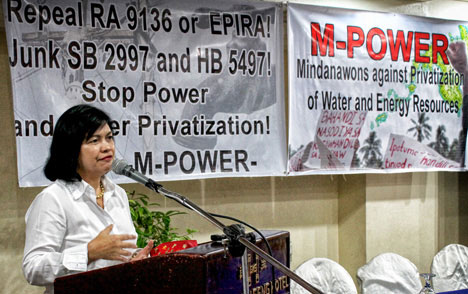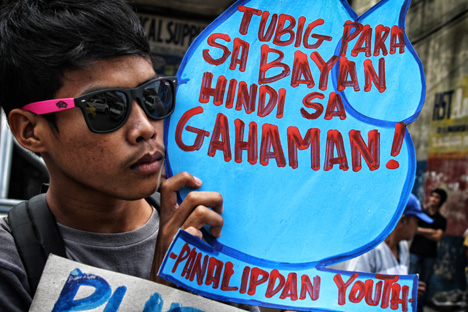
AGAINST THE BILLS. Imelda Magsuci, DCWD spokesperson, says they are against Senate Bill 2997 and House Bill 5497 “because the management of our natural resource will be given to private entities,” during the M-Power forum-cum-launching, June 5. (davaotoday.com photo by Ace R. Morandante)
“These bills are going to sell the water industry just like what the Epira Law did to the power industry: it altered the service-oriented industry to succumb to the profiteering nature of the private sector at the expense of the people” — Rudy Aranjuez, Chairperson of the labor union Nagkahiusang Mamumuo sa Davao City Water District
By JOHN RIZLE L. SALIGUMBA
Davao Today
DAVAO CITY, Philippines — “We may be a little late because this battle is already in its uphill climb. I ask everybody here to stand for the future and for our children,” Amado So, spokesperson of the Filipino-Chinese Heritage and Cultural Society (FCHCS), challenged during a forum by the Mindanawons against Privatization of Water and Energy Resources (M-Power), June 5 at the Grand Men Seng Hotel.
So was referring to the “battle” against Senate Bill 2997 (also known as the Angara Bill), which has now reached the Senate’s Committee on Public Services. The bill and its Lower House version, House Bill 5497, would pave the way to the full privatization of the country’s water districts.
Sen. Edgardo Angara sponsored Senate Bill 2997 or the Water Sector Reform Act, which “aims to provide a framework for efficient and effective management of water through an Integrated Water Resources Management approach.” According to Angara’s website, as chairperson of the Sub-Committee on Water, the senator “underscored the need to improve water services, citing that 16 million Filipinos or almost 20 percent have no access to potable water, 22 million Filipinos or 24 percent have no access to sanitation facilities, while 31 percent of illnesses recorded are actually waterborne.”
Both House and Senate versions seek to replace the National Water and Resource Board with the Water and Sanitation Regulatory Authority (WSRA).
“These bills are going to sell the water industry just like what the Epira Law did to the power industry: it altered the service-oriented industry to succumb to the profiteering nature of the private sector at the expense of the people,” said Rudy Aranjuez, Chairperson of the labor union Nagkahiusang Mamumuo sa Davao City Water District (Namadacwad) and the national chairperson of the Water Employees Response.
“The WSRA would directly be under the office of the President. He directly controls it to ensure the implementation of the Public-Private-Partnerships (PPP),” he said.
In Chapter 1, Section 4 of Senate Bill 2997, PPP refers to “management contracts, concession agreements or other similar arrangements between the government and a private person or entity for the provision of water and/or sanitation services in a particular Service Area pursuant to the provision to this Act.”

WATER FOR THE PEOPLE. A militant youth holds a placard reminding that water should be accessible to the people during a picket, June 8 in Davao City. Militants opposed the Angara Bill that will pave the way to privatization of water districts. (davaotoday.com photo by Ace R. Morandante)
FCHCS and Namadacwad are members of M-Power, an island-wide alliance formed in April which is composed of academic institutions, religious, neighborhood and environmental organizations; progressive and student and youth groups; and labor unions.
“We’re against these bills,” Imelda Magsuci, spokesperson of the Davao City Water District, said about Senate Bill 2997 and House Bill 5497, adding that, “the management of our natural resource which is the water will be given to private entities.”
“Second, the bills are adversarial to government employees. The law intends to exempt the employees from the salary standardization law. There’s amalgamation of assets and duplication of positions. Expectedly, there would be retrenchments,” Magsuci, also manager of the water district’s community relations and external affairs department, added.
She said the bills are patterned after the Metropolitan Waterworks and Sewerage Systems (MWSS), pointing out that, local autonomy will be eradicated.
The MWSS, a corporation that supplies water and sewerage services in Manila, used to be one of the country’s oldest government-owned and controlled corporations. It’s also one of the oldest waterworks systems in Asia. However, it was privatized under former President Fidel Ramos.
Now under Pres. Benigno Aquino III, water districts nationwide are set to be privatized.
“He’s already detached from the poor,” was how former Davao City councilor Danny Dayanghirang described President Aquino. Dayanghirang who is also Davao City’s drainage consultant, opposed the Angara bill because this would make water expensive for the public.
M-Power participants and conveners have agreed that more information dissemination in communities and schools must be done. A signature campaign is in the offing, they said.
Thea Talandron, a nun under the Franciscan Sisters of the Immaculate Conception, said the issues must be raised to the “Bishop, religious organizations and schools.”
Juland Suazo of Panalipdan, an environmental group, said they plan to launch fun-runs and protest runs to oppose the Angara bill. (John Rizle L. Saligumba/davaotoday.com)
World









